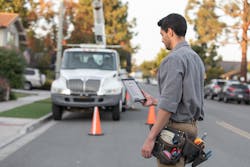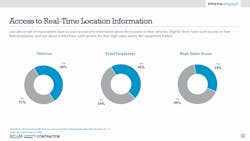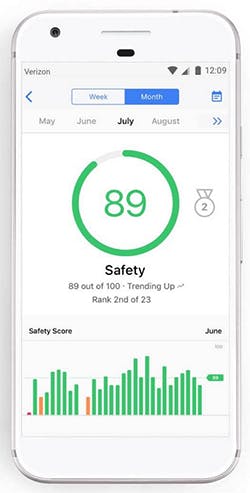Field service management solutions are a proven way to maximize the safety, productivity and efficiency of your vehicles and employees. These turnkey packages of hardware, software, connectivity and services provide actionable business intelligence about your mobile assets and the people who use them: where they are, what condition they’re in, how productive they are and more. These insights help you make money, save money and wow your customers.
But not all field service management solutions have the features and capabilities that electrical, plumbing, HVAC and other contractors need. Here are seven key questions to ask when comparing options.
1. How can you help me address scheduling inefficiencies?
Field service management solutions use GPS to ensure dispatchers, supervisors and other managers always know the exact location of each vehicle, equipment trailer and other mobile assets. These granular, real-time insights maximize productivity by ensuring that, for example, you route the closest employee to the job with the right equipment.
Contractor-grade solutions eliminate inefficiencies such as managers having to juggle multiple staff calendars and field employees manually updating their status. Instead, managers simply check a single screen to see which employees are available. When managers create or update job information, that information is instantly and automatically pushed out to the assigned employee’s mobile field service management app.
Look for software that runs on any laptop, tablet or smartphone so managers can create and update schedules from anywhere. It also should have an intuitive user interface, such as a map that lets managers tap on each asset to instantly see its capabilities and which employee is using it.
2. How can you help me rein in my insurance premiums?
Field service management solutions identify unsafe driving habits such as speeding and hard braking. These insights are critical for determining which employees need coaching and the bad habits to correct—all before they have an accident.
One success story is Bill Howe, a plumbing, HVAC, restoration and flood services company serving the San Diego area. The year before it started using Verizon Connect, it had 16 accidents totaling nearly $1 million in damages. The next year, it had just two.
Look for features such as instant alerts when unsafe driving occurs, personalized leaderboards that drivers can review and support for dash cams, which help with accident reconstruction. Another key feature is the ability to monitor each employee’s driving even when they use multiple vehicles.
Field service management solutions also provide a record of where each vehicle was—and wasn’t. This data enables fleet owners to defend against fraudulent claims.
3. How can you help me reduce vehicle downtime and maintenance?
By identifying and correcting unsafe driving habits, field service management solutions also help keep vehicles out of the shop. One example is minimizing the harsh braking and cornering that prematurely wears out components such as brakes, steering and suspensions.
Field service management solutions have modules that plug into each vehicle’s OBD II port so they can collect diagnostic trouble codes for the powertrain, brakes, lighting and other key systems. This enables fleet owners to catch low emerging problems before they escalate into extensive, expensive damage.
This data also helps fleet owners make informed decisions when it’s time to replace vehicles. For example, now they know exactly which models have higher or lower downtime.
Finding the Field Service Management Software that's right for your business could be difficult. Download this free Buyer's Guide to help you through this process.
4. Can I leverage my existing telematics and navigation hardware?
The ideal field service management solution supports telematics hardware that original equipment manufacturers (OEMs) build into their trucks, vans and vehicles, as well as aftermarket hardware. For example, Verizon Connect supports telematics hardware from Ford, FUSO, GM, Hino INSIGHT, John Deere, Mack, Ram and Volvo.
This integration eliminates the need for OBD II modules, so brand-new vehicles can be remotely activated and provisioned over cellular, instead of having to come into the shop for initial setup. It also enables the field service management solution to access data that’s exclusive to a particular OEM, such as John Deere’s JDLink.
The ideal field service management solution also can support a fleet’s existing navigation devices. For example, Verizon Connect supports Garmin hardware, so dispatchers can send a stop from Live Map to the field instantly, or simply press “Go” to send turn-by-turn directions to a driver.
5. Can I integrate it with my existing software and apps?
The best field service management solutions provide application programming interfaces (APIs), which vendors use to create custom, secure connections to their software and mobile apps. These make it quick and easy for businesses to integrate their new field service management solution with their existing systems for billing, CRM and more.
Some field service management solution providers also offer marketplaces where businesses can add software. For example, the Verizon Connect Marketplace offers QuickBooks Online Integration for Work, Prophesy HighJump and ServiceMax.
6. How can you help me reduce fuel consumption?
Tools such as route optimization enable dispatchers and other managers to identify the fastest way for employees to get to each job site. For example, Verizon Connect’s RouteCloud algorithm analyzes millions of options and presents the best one, including for multi-stop routes. That means less fuel is wasted sitting in traffic jams or taking the long way.
Field service management solutions also help drivers avoid delays that basic in-vehicle GPS systems don’t identify. One example is detailed, real-time updates on road construction, so drivers can avoid a road whose new weight or height restrictions can no longer accommodate oversize commercial vehicles such as bucket trucks.
7. How can you help my employees stay safe?
Electricians, plumbers, HVAC technicians and other contracting professionals frequently work alone, sometimes on remote job sites. Field service management solutions enable supervisors and other managers to quickly check the status of lone workers. For example, if an employee isn’t where he’s supposed to be, or isn’t answering calls and text messages, the manager knows to have someone swing by that job site to check.
These real-time insights provide additional benefits. It’s now easier to verify time on task for billing, while customer satisfaction benefits because it’s easy to determine which employee is closest.
If you’re ready to get started, download “Field Service Management Software: A Buyer's Guide.” It’s packed with tips for choosing the solution that’s right for your business. In it, you’ll learn:
- The major features and how they help maximize customer satisfaction, profits and employee productivity.
- How to ask the right questions about pricing, reporting, customizability, setup, training, long-term vendor support and more.
- How to develop a successful implementation roadmap for every employee and mobile asset.
Click here now to download the free buyer’s guide.
Sponsored By:




